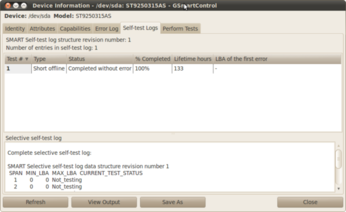Keep an Eye on Your Hard Disk's Health with GSmartControl

Productivity Sauce
SMART-capable hard disks are commonplace these days, and there are a few tools that can help you to use this technology to monitor the health of your hard disk. The smartmontools toolset, for example, lets you monitor and manage hard disks from the command line, while the GSmartControl utility can be used to keep a close eye on the hard disks. Despite its simple interface, GSmartControl is a rather capable tool that automatically reports and highlights any anomalies, performs short self-checks every four hours, and provides comprehensive info about the hard disks and their capabilities.
The best part is that GSmartControl makes it supremely easy to monitor your hard disk's health. When you launch the utility, it shows all the detected hard disks. Select the disk you want, and your should see the disk's health status in the Basic health check section. To access other GSmartControl features, double-click on the hard disk icon. This opens the Device Information window containing a wealth of information and additional features. The Perform Tests section, for example, lets you run short and extended hard disk tests, while the Attributes section provides an overview of the hard disk parameters and their current status. GSmartControl provides an extensive online help, so to view a detailed description of a specific item in the list, hover the mouse over it.
GSmartControl is available in the software repositories of many popular Linux distributions, so it can be installed using your distro's package manager. On Ubuntu, you can install GSmartControl using the sudo apt-get install gsmartcontrol command.
comments powered by DisqusSubscribe to our Linux Newsletters
Find Linux and Open Source Jobs
Subscribe to our ADMIN Newsletters
Support Our Work
Linux Magazine content is made possible with support from readers like you. Please consider contributing when you’ve found an article to be beneficial.

News
-
New Linux Botnet Discovered
The SSHStalker botnet uses IRC C2 to control systems via legacy Linux kernel exploits.
-
The Next Linux Kernel Turns 7.0
Linus Torvalds has announced that after Linux kernel 6.19, we'll finally reach the 7.0 iteration stage.
-
Linux From Scratch Drops SysVinit Support
LFS will no longer support SysVinit.
-
LibreOffice 26.2 Now Available
With new features, improvements, and bug fixes, LibreOffice 26.2 delivers a modern, polished office suite without compromise.
-
Linux Kernel Project Releases Project Continuity Document
What happens to Linux when there's no Linus? It's a question many of us have asked over the years, and it seems it's also on the minds of the Linux kernel project.
-
Mecha Systems Introduces Linux Handheld
Mecha Systems has revealed its Mecha Comet, a new handheld computer powered by – you guessed it – Linux.
-
MX Linux 25.1 Features Dual Init System ISO
The latest release of MX Linux caters to lovers of two different init systems and even offers instructions on how to transition.
-
Photoshop on Linux?
A developer has patched Wine so that it'll run specific versions of Photoshop that depend on Adobe Creative Cloud.
-
Linux Mint 22.3 Now Available with New Tools
Linux Mint 22.3 has been released with a pair of new tools for system admins and some pretty cool new features.
-
New Linux Malware Targets Cloud-Based Linux Installations
VoidLink, a new Linux malware, should be of real concern because of its stealth and customization.

